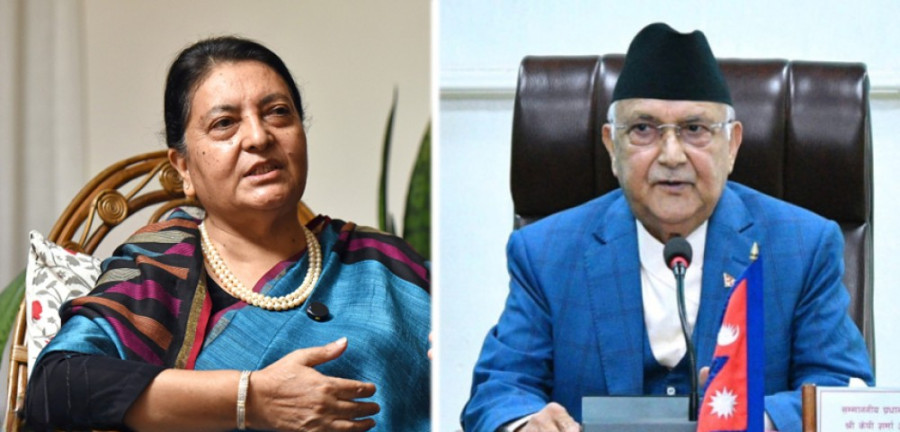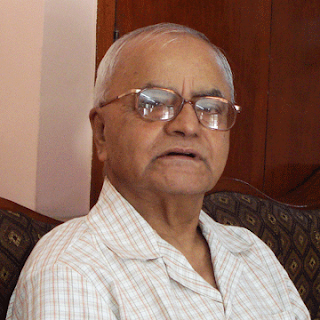Columns
Bidya’s party re-entry and beyond
Her entry has unnerved Oli, who sees her as a threat to his unchallenged leadership.
Lok Raj Baral
Former President Bidya Devi Bhandari joining the Communist Party of Nepal (UML) has created ripples in Nepali politics. The occasion she chose to join was the birth anniversary of Madan Bhandari, her late husband, who died in a road accident in 1993. The actual reasons for the ‘accident’ are still a mystery, with conspiracy theories circulating since then. The present prime minister, KP Sharma Oli, was the investigation chief to dig out the truth, but in vain. Madan’s short-lived political career had earned him momentary fame for transforming the party into a multiparty democracy—Janatako Bahudaliya Janbad (People’s multiparty democracy) and for raising the party’s status to the second position in Parliament, next to the Nepali Congress (NC).
Bidya was a non-entity in her party when Madan died. She came into the limelight after being nominated as a candidate in the by-election that fell vacant due to her husband’s death. Former prime minister, Krishna Prasad Bhattarai of the NC, was defeated by her, presumably with the combined support of her party and the anti-Bhattarai congressmen, including palace agents. Prime Minister Girija Prasad Koirala delivered a long television speech about not supporting Bhattarai, to which other elements who disliked Bhattarai got a hint of his defeat.
Thus, many CPN-UML activists believe that Bidya was a student activist in Morang before she married Madan Bhandari and gained prominence only after her debut in parliamentary politics. She was appointed as minister during the coalition government headed by NC’s Sher Bahadur Deuba. Later, she became the defence minister and subsequently the CPN-UML nominee for the post of President.
During her presidential tenure, she obliged Oli by accepting unconstitutional decisions such as the dissolution of the House of Representatives and many ordinances, including the appointment of 52 constitutional heads and other functionaries. Oli’s move to dissolve Parliament was twice overturned by the Supreme Court. Bhandari also favoured Oli in heading the government when other parties had already claimed a majority. The ceremonial post of the head of the state was flagrantly violated at the prime minister’s behest.
Now, Bidya’s entry has become a nemesis that has seemingly unnerved Oli, who sees her as a threat to his unchallenged leadership and dominance. Determined as he is, Oli has set out to cut her to size, despite much damage already done by polarising the party into Oli and Bhandari camps. Some senior leaders have indirectly supported her move based on the constitution’s silence on the issue of former heads of state joining practical politics, and by others who keep quiet for fear of being penalised by Oli as a party president. The reasons argued by some leaders are age and health factors, which Oli refuted, asserting that he is physically fit and that his age (above 70) didn’t matter till he could play an active role in politics.
Even if the constitution does not explicitly mention the post-retirement politics of former heads of state and vice-presidents, nowhere in the world has such a practice been followed by the ceremonial heads. In politics, the legal aspect alone does not matter if universal standards and experiences are not followed. In India, no former presidents and vice-presidents have rejoined their parties after retiring. Pranab Mukherjee, a long-time player of Indian politics, left behind party politics upon his retirement. Recognising his impartial role as President of India, the Narendra Modi government honoured Mukherjee with the Bharat Ratna, highest civilian award. Mukherjee was the nominee of the Indian National Congress, an arch rival of the Bharatiya Janata Party (BJP), but the BJP respected Mukherjee because of the stature he made during his lifetime.
Even the first President of Nepal, Ram Baran Yadav, fulfilled his role with dignity and honour despite a few controversial decisions he took while in office. The first was that he overturned the cabinet decision to sack the chief of the army staff (CoAS), Rookmangud Katawal, weighing the pros and cons of such a decision. The Maoist-hyped slogan and mission of capturing state powers might have led him to take political decisions without which the country would have landed in one-party communist rule. Subsequently, the Maoist supremo Pushpa Kamal Dahal admitted his error in sacking the CoAS shortly before his retirement.
Bhandari’s decision to rejoin her party seems to be guided by her political ambition, regardless of the position that Oli would take to counter her. Perturbed as he appeared while celebrating Madan Bhandari’s death anniversary, where Bidya was also present, Oli’s insinuation was directed against Madan and Bidya, both of whom, as Oli said, were supported by him and other party functionaries for putting them in their respective positions.
Now, the issue of the former head of state joining politics has become a matter of concern. Party leaders are expressing their anxiety about Bhandari setting a wrong precedent. Intellectuals, the media and other people are not happy with Bidya’s political adventure, as her role as head of the state showed dismal performance. Bidya could have rejected the presidential offer before the CPN-UML decided to nominate her. But lured by office and glamour, she thought that her political ambitions of becoming a party leader or a prime minister would remain unfulfilled if she didn’t take the chance. Her timing was also considered appropriate, as Oli’s opponents wanted her to take over the party’s mantle, even if he didn’t give up voluntarily. Oli’s age and the party’s previous decision not to allow anyone above 70 to continue in leadership emboldened her to join the party.
Another alleged factor was the Chinese wish to unite the party under her leadership. Though unverifiable, the Chinese endeavour to unite all communist forces is not hidden. Whatever the reason, Bhandari’s plunge into the whirlpool of active politics does not set a good precedent, nor does it do her any good.




 8.79°C Kathmandu
8.79°C Kathmandu















